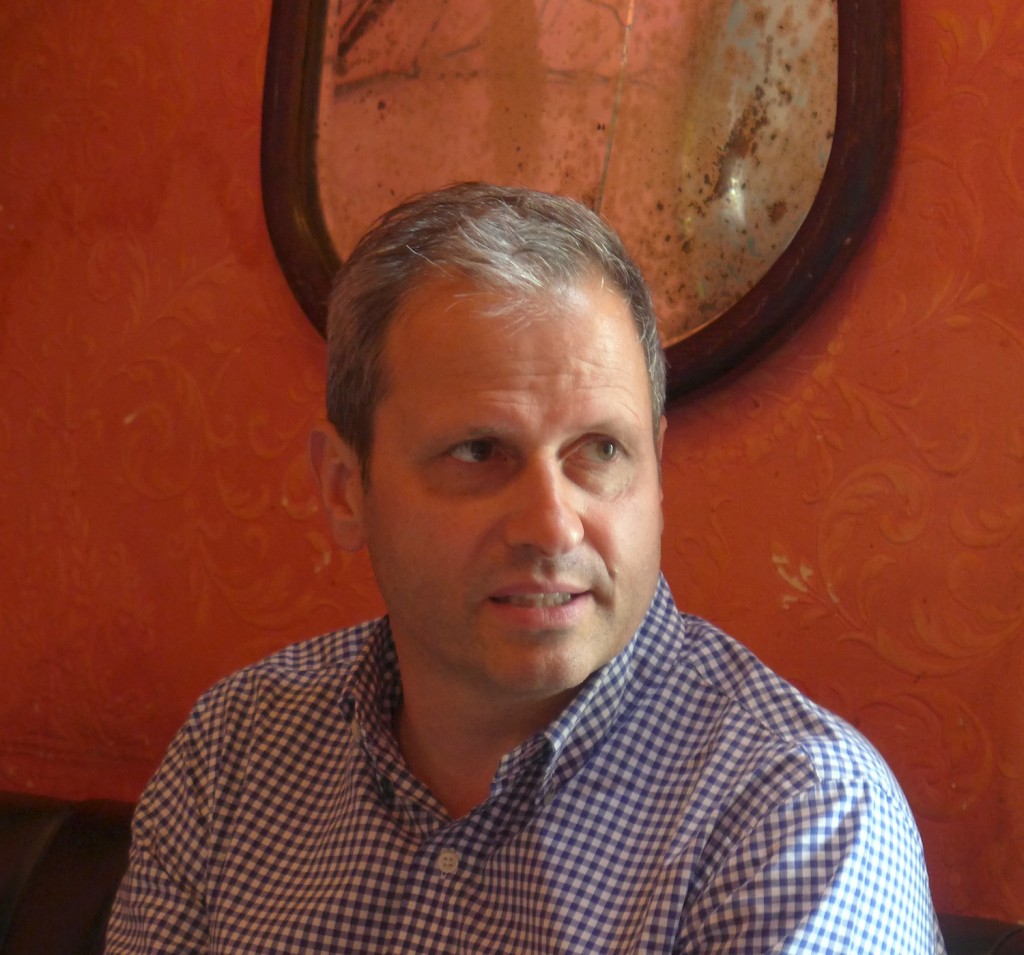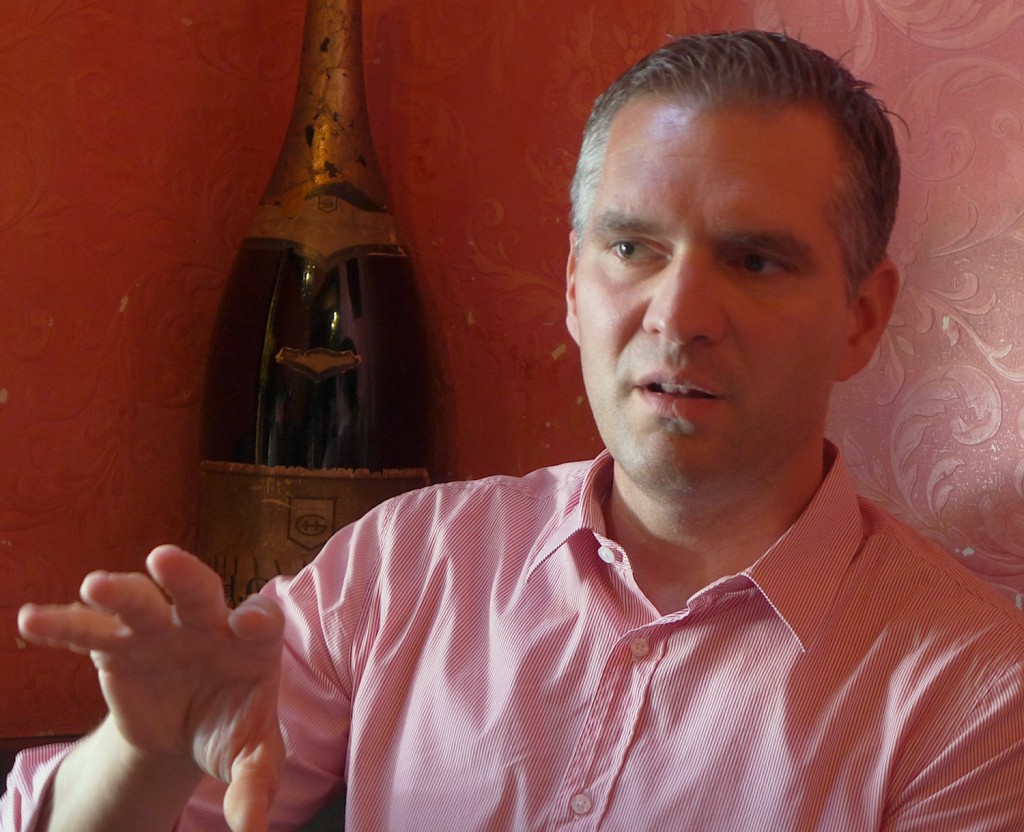 This afternoon the tasting of single-vineyard Rieslings of the new ‘GG’ category at Hotel Delmano in Williamsburg/Brooklyn was one of most fascinating tastings I’ve attended in a long time, period. Steffen Christmann of the Christmann estate in Gimmeldingen/Pfalz, and president of the national VDP producers association that created this category just over a decade ago, explained in fascinating detail how his Riesling ‘GG’ from the Idig vineyard came to be what it is today, beginning with the history of this site that goes back to 1367. However, it only became important for the Christmann estate in 1988, when Steffen was able to lease (later purchase) a large chunk of it from the then much larger and better-known von Buhl property in nearby Deidesheim. With its combination of a south-facing slope, serious exposure to wind and heavy, slow-warming limestone-clay soil it is a real exception in an area dominated by gentle easterly slopes and sandy soils (generally derived from red sandstone).
This afternoon the tasting of single-vineyard Rieslings of the new ‘GG’ category at Hotel Delmano in Williamsburg/Brooklyn was one of most fascinating tastings I’ve attended in a long time, period. Steffen Christmann of the Christmann estate in Gimmeldingen/Pfalz, and president of the national VDP producers association that created this category just over a decade ago, explained in fascinating detail how his Riesling ‘GG’ from the Idig vineyard came to be what it is today, beginning with the history of this site that goes back to 1367. However, it only became important for the Christmann estate in 1988, when Steffen was able to lease (later purchase) a large chunk of it from the then much larger and better-known von Buhl property in nearby Deidesheim. With its combination of a south-facing slope, serious exposure to wind and heavy, slow-warming limestone-clay soil it is a real exception in an area dominated by gentle easterly slopes and sandy soils (generally derived from red sandstone).
The 2011, ’09 and ’07 vintage Idig ‘GG’s which he showed were rather rich and texturally complex dry Rieslings, but with an underplayed power, intense herbal aromas and serious freshness. That is also a long way from the ripe, fruity norm of the region, but this difference is not the result of any kind of “freaky” winemaking techniques that pretend to turn the clock back to a time when wine was supposedly more “natural” than it is now. For him taking a minimalistic approach in the cellar is just the best way to preserve the quality and character of his wines. Likewise, Steffen’s vineyard cultivation is biodynamic, but this is no dogma in his case, rather a pragmatic decision to take the path which he believes leads to the best possible grape quality. The only agenda is the openly declared one of making wines in which sophistication and originality are balanced. Too much sophistication might result in an affected or overly cerebral wine; too much originality might taste brutally authentic.
 When Philipp Wittmann of the Wittmann estate in Westhofen/Rheinhessen – the region historically most closely associated with Liebfraumilch, but today “the Dream Factory of dry German white wine” (my quite frequently quoted words) – spoke about his ‘GG’ wines from the Morstein site of Westhofen he emphasized the word personality. I think you can see from the photograph that he used that word very precisely, and that what he meant is that a special vineyard site should give a wine of a special character that cannot easily be confused with that of other wines, “what makes a vineyard a Grand Cru is that you get this personality every year.” In the case of the Morstein this has to do with the limestone bedrock that is covered by a layer of clay-loam that looks heavy, but is often only a thin covering over the bedrock. This is a high-altitude site (up to almost 800 feet above sea level) and the grapes typically ripen five days later than in the Idig, just 20 miles south.
When Philipp Wittmann of the Wittmann estate in Westhofen/Rheinhessen – the region historically most closely associated with Liebfraumilch, but today “the Dream Factory of dry German white wine” (my quite frequently quoted words) – spoke about his ‘GG’ wines from the Morstein site of Westhofen he emphasized the word personality. I think you can see from the photograph that he used that word very precisely, and that what he meant is that a special vineyard site should give a wine of a special character that cannot easily be confused with that of other wines, “what makes a vineyard a Grand Cru is that you get this personality every year.” In the case of the Morstein this has to do with the limestone bedrock that is covered by a layer of clay-loam that looks heavy, but is often only a thin covering over the bedrock. This is a high-altitude site (up to almost 800 feet above sea level) and the grapes typically ripen five days later than in the Idig, just 20 miles south.
After the 2007 vintage Philipp moved the style of his Rieslings from dry to bone dry and the mineral – almost reminiscent of brine – flavor in the ’12 and ’11 vintages is much clearer as a result. They also have plenty of ripe yellow fruit aromas and the tension between them and the mineral character, no less than between richness and freshness makes them amongst the best Riesling ‘GG’ wines produced today. Both vintages are still very young and the more air these wines get (without becoming too warm) the better they show. Of course, like Christmann’s Idig the Wittmann Morstein isn’t cheap, but compared with the bubble-prices for Premier Cru and Grand Cru white burgundy they look rather friendly. And in quality terms that’s certainly a fair comparison, because ‘GG’ is conceived of by the VDP as the dry “Grand Cru” of Germany, Spätlese and Auslese from the top sites being the equivalent for sweeter wines.
What we had today was two “case studies” that were both fascinating and, for anyone looking for sophistication and originality, delicious. For information on the other dry Riesling ‘GG’ wines that belong in the same league turn to BEST WHITE WINE ON EARTH – The Riesling Story, published by Stewart, Tabori & Chang. Thank you Alex Alan for making this great seminar tasting possible!

![120114_riesling_global_RZ [1600x1200]](http://www.stuartpigott.de/wp-content/uploads/2014/06/120114_riesling_global_RZ-1600x120014.jpg)